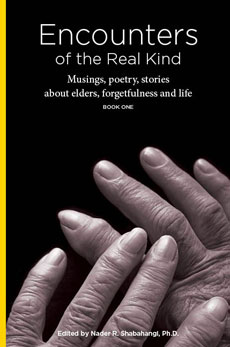Nader R. Shabahangi developed in 1994 an innovative Gerontological Wellness Program in order to provide emotional support and mental health care services for the elderly. In this paperback which he edited, psychology interns share their responses to working with people in eldercare or assisted living; most of the clients have some form of forgetfulness, including Alzheimer's, and Vascular, Frontal Temporal Lobe Dementia. One of the students, Chris Schacker, writes in the preface about "what it is to be with the forgetful ones."
"As with the loss of one of the physical sense, the other senses become heightened, more acute. So it is with forgetfulness. When logic or data points grow dim, when words don't work, a state of knowing — feeling, sensing — becomes more acute. . . . I become forced to learn a new language; one that is honest, apolitical; a language that includes an admission of 'I don't know,' when I don't. I must learn to listen, not just with my ears; see not just with my eyes, and feel a message sent, without touch. I have to pay attention. I have to be present, now."
The spiritual encounters with elders recounted in this book touch the heart. Felicia Less writes of one relationship: "I could feel how close we have become by the warm and friendly tone of our silences." Snehal Shah has coffee every morning with an elder and comes to appreciate the "common thread" he has with the man. Erin Brunner, on the other hand, is most impressed with the fact that "each resident has something unique and strong and valuable to offer the community."
There are many treats to be found in the interaction between these young people and the elders they serve. They learn about the slowness of time and movement, the burden of pain, the tenderness and vulnerability revealed in poems, the delights of meals together, cookies and song, and the mutually beneficial art of smiling and laughter.
